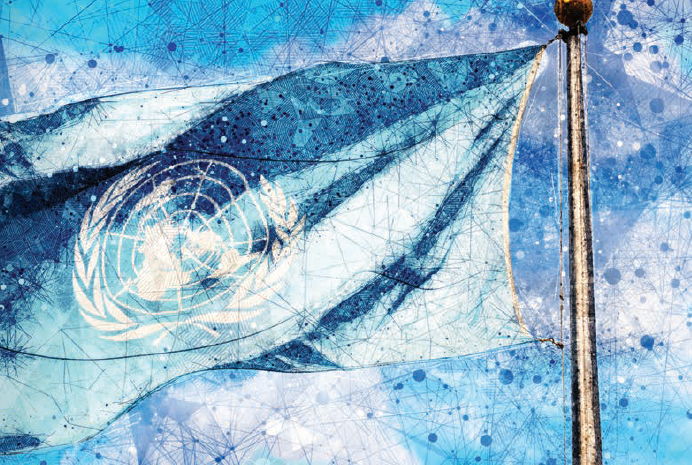The race to achieve universal health coverage
The unique opportunity for action that will present itself at this September’s high level meeting on health coverage
By Her Excellency María Fernanda Espinosa Garcés, president of the 73rd Session of the UN General Assembly
At least half of the world’s population does not have full coverage of essential health services. Health expenses push more than 100 million people into extreme poverty each and every year, forcing them into terrible choices that no one should ever have to make: Buy medicine or food? Education or health care?
These stark statistics make the case for universal health coverage compelling.
Of course, even if each of these reasons alone were not enough for us to continue to push for universal health coverage, we must be clear that health is a human right. Achieving universal health coverage and guaranteeing that everyone has access to quality, essential health services are pivotal steps to ensuring that every individual enjoys their fundamental human rights.
Furthermore, today in the era of the Sustainable Development Goals, universal health coverage must be seen for what it is: a powerful instrument to achieve not only SDG 3 on health but the entirety of the 2030 Agenda. Last September, in the very beginning of my mandate as the 73rd president of the General Assembly, I had the honour to chair two health-related high-level meetings, one on the fight against tuberculosis and one on the prevention and control of non-communicable diseases.
Now, on 23 September 2019, when world leaders gather in New York to participate in the United Nations General Assembly High Level meeting, to be held under the theme of Universal Health Coverage: Moving Together to Build a Healthier World, we will have a unique opportunity to establish the foundation for achieving the goal of universal health coverage by 2030.
There is no one-size-fits-all approach to meeting this goal. Each country must explore its own tailor-made solutions to strengthen its health systems. In doing so, priority must be given to preventing disease and promoting health, as well as to ensuring access to medicines, vaccines, diagnosis and other health technologies.
The United Nations has always stood ready to offer its expertise and assistance regarding global health. When I am asked to give examples of the UN’s biggest achievements, I often find myself speaking about the World Health Organization. Consider the eradication of smallpox, for instance – a success we have nearly replicated with polio – the significant reductions in new HIV infections we saw during the first decade of this century, and the advances we have made in the fight against malaria and tuberculosis.
And alongside these targeted campaigns – indeed, because of them – is the growing push for universal health coverage and strengthened primary care services, culminating in the adoption of SDG 3.
Health is wealth
Elsewhere, as so often, women and girls suffer disproportionately when it comes to sexual and reproductive health and also when it comes to accessing other basic services. Persons with disabilities, Indigenous peoples, minorities and people living in rural areas are also more likely to have poor health outcomes.
This is totally unacceptable, and profoundly wrong. It runs counter to our commitment to leave no one behind. It is also economically unsustainable.
The macro-level impact of poor health services is enormous – estimated at trillions of dollars every year in lost productivity, long-term impairment and short-term expenditure. As the saying goes, health really is wealth.
If we look at the full impact and cost of poor health services, the case for prioritising universal health coverage is clear. That Ebola outbreak in West Africa, for instance, showed the world the importance of robust and inclusive health systems. Our aim in September must be to accelerate progresson coverage.
This will be a crucial opportunity for us to address all the ‘key asks’ of the universal health coverage movement,
which are:
- Ensuring political leadership and commitment across government and society;
- Pursuing equity in access to quality health services with financial protection;
- Creating a strong, enabling regulatory and legal environment that responds to people’s needs;
Building high-quality health systems that people and communities trust; - Increasing and harmonising domestic and international investment; and
- Establishing multi-stakeholder mechanisms – so that conversations continue in all countries.
The Interactive Multi-Stakeholder Hearing, held on 29 April, brought together more than 600 representatives of member states, as well as UN entities, civil society, non-governmental organisations, academia and the private sector, among other stakeholders. It demonstrated that achieving universal health coverage is a collective and cross-cutting challenge.
In this regard, I want to recognise the valuable work of the co-facilitators – the permanent representatives of Georgia and Thailand – as well as the members of the Group of Friends of UHC, under the leadership of the permanent representative of Japan, in helping to lay the groundwork for the high-level meeting. Additionally, I also want to praise the support
received from the WHO and the UHC2030 coalition, which have proven to be essential in preparing a successful high-level meeting in September.
The Universal Declaration proclaimed the right to health in 1948. Seven decades on, it remains a distant dream for half the world’s people. Let us seize the opportunities we have to change that. Together, we can make universal health coverage a reality by 2030.












